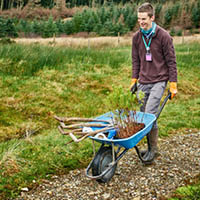Growing Roots: Creating Sustainable Adventure Experiences with Trees

This programme offers participants paths to engage in a deeper sense of being in place and nature though collaborating with trees. If you already have a proclivity for nature then you are likely to find this programme an invigorating opportunity to develop your sensibilities with other like-minded people.
Taking an innovative and deeper approach to sustainability, we recognise change in our inner worlds is at the root of the sustainability challenge and the objective of this programme is to start change from the ‘inside out’ (Ives, Freeth, Fischer 2020:209).
Participants will become more in tune to distinctions between an anthropocentric concern for the environment and an ecological reframing of our place in the world. The process of shifting our relationship with the environment occurs cumulatively. At the end of the course, participants will have more ideas for stimulating environmental health and human well-being, including financial benefit, in holistic synergy.
The objective is for participants to become custodians for their environment and be successful designing nature-based experiences for community, for visitors and for partnerships with local authorities. A need to diversify rural income sources inspires this training to present tourism as an option and there is emphasis on how tourism experiences can be directed toward schools, NGOs, third-age care, local community groups, and participants’ financial and psychological well-being within the climate emergency.
So far this programme has been offered to individuals who are deeply committed to and embedded in the rural Highlands, rooted in communities with access to land, with professions such as community land managers, social enterprises, crofters, etc benefiting from this course. The knowledge offered and co-created aims to enrich more than the individual and grow this community of interest by sharing ideas and empowerment.
Visit the Growing Roots: Creating Sustainable Adventure Experiences with Trees course page.
To enhance the learning experience, participants are encouraged to access reasonable internet connectivity and keep their cameras on as much as possible during sessions. This is because people learn enormously from sharing experiences. Each week, as we design the blueprint for an experience, we need to feel comfortable talking and co-creating together.
Select the drop-down buttons for an overview of what you'll learn during the course:
Week one
Week one
Conceptual Framework, Tamara Griffiths
An overview of conceptual changes of rural land in the UK and Europe including post-productivism and multi-functionality. This will lead us into the experience economy and aspects of understanding changes in adventure with a focus on new tourism patterns and slow tourism. Each week concludes with designing experiences that correlate with the themes in the session – you can build multiple experiences or develop one in depth experience.
Week two
Week two
Custodianship, guiding, unusual wildlife photography, Tamara Griffiths and Phil Knott
This session follows the structure of weeks to come. The first part is conceptual and the second part is practical. In the conceptual section we investigate aspects to consider for successful guiding outdoors and thematically relate this back to Slow tourism, experience economy, eco economy and multifunctionality from week one. We consider interpretation of nature as a social construct. The practical section focuses on key points for delivering a unique, at home, wildlife photography experience with moths, to stimulate understanding of local biodiversity.
Week three
Week three
Forest gardening for food and the experience economy, Tamara Griffiths
Introduction to forest food gardening concepts, including simple practical aspects to get started with your own forest food garden. Followed by an opportunity to explore the experience economy in detail and discuss how our designs for experiences can be influenced by this knowledge. Additionally, we learn about the origins of the Slow movement and how can be used today with forest foods.
Week four
Week four
Understanding craft and biocultural heritage, Tamara Griffiths
Introducing the idea of crafts we will revisit concepts from the first week, and how crafts connect to these. We look at new perceptions of craft which create very different understandings – based on cognitive archaeology research at University of Oxford. Then we explore new concepts of storytelling and biocultural heritage experiences.
Week five
Week five
Tree Lives; Sentience of trees, synergies with humans, Tamara Griffiths
This week investigates synergies between people and trees in three frameworks: traditional thinking with ritual and history, critical theory in humanities, and finally scientific theory, thereby forming three sections. We start with the traditional affinities and then move to the contemporary.
Throughout and at the end of the session we will discuss how these ideas could be put into practice in terms of designing experiences with trees. Then, continuing a main theme in this programme, i.e. the thought process of collaborating with the natural environment, we explore how we understand trees and plants in relation to ourselves. The session ends by adding to our blueprint design for a forest experience, assembling recent science, and dynamic critical theory with traditional beliefs.
Week six
Week six
To be confirmed.
Week seven
Week seven
Revisiting Interpretation and Guiding skills within Woodland Crofts
In this final session we learn about the evolution of woodland crofts and revisit the material in weeks one and two in the context of the historic dichotomy of arable and forest, connecting to the nature and culture division in western thinking. This session concludes with a final discussion of the experiences which we have designed each week, now enriched by the context of a woodland croft.
About the team
Get to know the expert staff that deliver this course:

